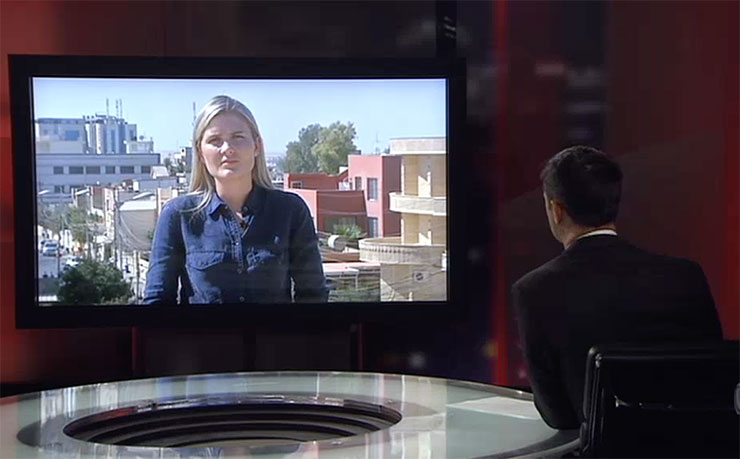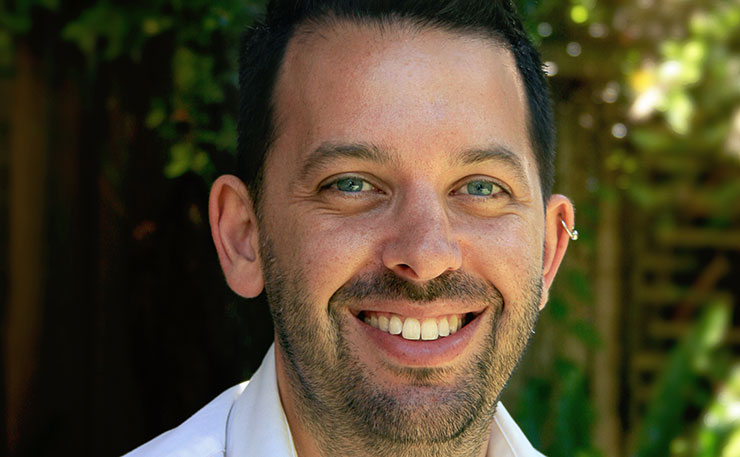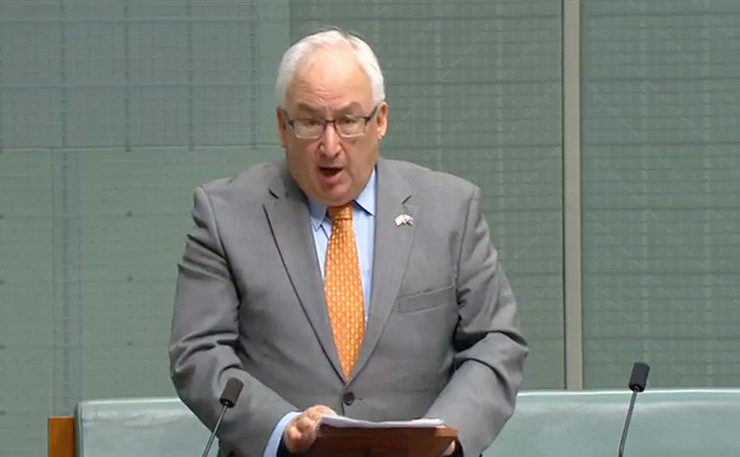The long political career of Labor’s most outspoken supporter of Israel appears to be in terminal decline, writes Michael Brull.
The public fall of Labor Member of Parliament Michael Danby has been remarkable to watch, in part because of his long record of vicious smears, including about me, but also because of what it indicates about the trajectory of the ALP on the question of Palestine.
The most recent controversy has involved a series of advertisements. Danby used taxpayer money to print an advertisement in the Australian Jewish News attacking ABC Middle East correspondent Sophie McNeill. The advertisement says in red print “Why the double standards?”, claiming that McNeill gave “EXTENSIVE” coverage to Palestinians evicted, but “MINIMAL REPORTAGE” to a Jewish family killed.
This is a familiar slur from Danby – he regularly claims such double standards are a sign of anti-Semitism.
The ABC strongly defended McNeill from similar attacks by a Liberal Senator in 2015. And they strongly rejected Danby’s criticisms too, complaining to Labor leader Bill Shorten. Senior Labor figures were reportedly dismayed by Danby’s conduct.

Adam Gartrell and Broede Carmody reported that, “Top Labor figures believe ‘it’s time’ for outspoken federal MP Michael Danby to retire as anger over his taxpayer-funded attacks on an ABC journalist sparked fresh speculation about his future.”
Indeed, if he failed to announce his impending retirement, they were “preparing for a possible pre-selection challenge in case he does not.”
 Those appalled by Danby’s conduct reportedly include Shorten. Carmody and Gartrell reported on a “a heated phone conversation on Wednesday”, where “Mr Shorten instructed Mr Danby – his factional ally – to withdraw the latest ad but it had already been sent to the printers.”
Those appalled by Danby’s conduct reportedly include Shorten. Carmody and Gartrell reported on a “a heated phone conversation on Wednesday”, where “Mr Shorten instructed Mr Danby – his factional ally – to withdraw the latest ad but it had already been sent to the printers.”
They reported that, “Federal party sources say they are fed up with Mr Danby using political capital to attack the media rather than the government.” Some felt another candidate would do better at winning the seat – Danby currently holds Melbourne Ports with a 2 percent margin. Danby later conceded that he had been pulled into line by Shorten, and would not run any more ads attacking McNeill.
Meanwhile, the ABC stepped up its counter-attack on Danby, writing, “We’ve gone from unfair and wrong accusations in the first ad to the bizarre in the second, which tries to link two completely separate events. It shows the extent to which this is a personal attack, rather than any fair assessment of the value and accuracy of the ABC and Sophie’s reporting”.
Jewish communal groups and the Anti-Defamation Commission have backed Danby’s ads. Their positions appear to have no weight or influence within the ALP. Even the traditionally spineless Fairfax reported frankly: Danby’s “central allegation – that McNeill failed to cover a violent stabbing of a Jewish family – was demonstrably false.”
That is, Danby has faced somewhat critical coverage from the Guardian, Fairfax, the ABC, and from his colleagues in the ALP.
In August, Andrew Bolt reported on his blog Danby’s admission that Saturday Paper refuses to run his paid advertisements. Danby is totally isolated, particularly from any kind of major progressive institution, and his career seems to be wrapping up, in quiet ignominy as his allies in the party tell him to pipe down.

My acquaintance with Danby goes back to 2009. Then, Israel was bombing Gaza, and so I published my first op eds criticising the war on Gaza. At the time, such critiques were rare, and so the strongest voices regularly criticising Israel were relatively fringe – myself in New Matilda, and Antony Loewenstein at Crikey.
Danby responded in a speech in parliament a few months later, insinuating that all of us – Antony, Crikey, New Matilda, me – were anti-Semitic. This was after the Anti-Defamation Commission had quietly lobbied New Matilda – and perhaps Crikey too – to “institute fair coverage”. This was because of 18 articles in three months on Israel and Palestine, “17 presented the Palestinian narrative”.
In the report by the ADC that spurred their letter, they complained that eight of those articles were written by authors “well-known as polemicists for the Palestinian position.” The authors in question were Antony Loewenstein and myself. The author of the report wrote a follow up report where she complained that New Matilda’s editor “denies any responsibility for provoking anti-Semitism by demonising Israel”. The obvious conclusion is that the “Palestinian narrative” itself offends them, and they believe it provokes anti-Semitism.
As New Matilda and Crikey ignored the complaint by the ADC, Danby denounced us all in Parliament. No-one outside our publications thought there was anything inappropriate about this kind of bullying. Similarly, there was no serious outcry when a group of academics wrote to Overland to express outrage that it would print criticisms of Israel, particularly an essay by me (my contribution was identified as “embarrassing and shameful”, “overtly defamatory” and so on).
Danby had a long record of similar bullying. When Antony was writing his book – long before it was published – Danby urged Melbourne University Press to drop the “whole disgusting project”.

His antics weren’t just carried on in relation to the media. In 2002, backbench Labor MP Julia Irwin advanced a motion for Parliamentary debate. It called for a two state agreement, UN peacekeepers in the Occupied Palestinian Territories, and for Israel to withdraw its forces. Danby aggressively campaigned against Irwin, trying to prevent the debate from happening. Irwin was later told that her speeches on Palestine had to be vetted by ALP powerbrokers. She was also advised to visit the Holocaust Museum, and meet with Jewish organisations.
 Irwin was effectively marginalised for her criticisms of Israel, and discussed it frankly as she left Parliament. She said it was understood in the party that “support for Palestine will swiftly end any prospect of a front bench position. Even a hint of offence can result in an immediate unconditional apology”. This seems to be reflected in the position of Tanya Plibersek, who began by harshly criticising Ariel Sharon, then deeply mourning his death. Since repenting for her criticisms of Israel, Plibersek has become Deputy Leader of the ALP, and has distanced herself from the moves towards the ALP adopting mildly more critical positions on Israel, such as recognising Palestine.
Irwin was effectively marginalised for her criticisms of Israel, and discussed it frankly as she left Parliament. She said it was understood in the party that “support for Palestine will swiftly end any prospect of a front bench position. Even a hint of offence can result in an immediate unconditional apology”. This seems to be reflected in the position of Tanya Plibersek, who began by harshly criticising Ariel Sharon, then deeply mourning his death. Since repenting for her criticisms of Israel, Plibersek has become Deputy Leader of the ALP, and has distanced herself from the moves towards the ALP adopting mildly more critical positions on Israel, such as recognising Palestine.
I think this neatly identifies the change in the ALP. The leadership, then as now, is strongly supportive of the Israeli government. But the Julia Irwin wing – the marginalised dissidents critical of Israel, and at times gagged – have now become the Michael Danby wing. Labor politicians have strongly spoken out against Israeli oppression and war crimes, most notably in the 2014 Canberra Declaration.
The membership is increasingly uncomfortable with Israeli actions, and the corporate media is no longer willing to tolerate the aggressive bullying of Danby. The fall of Danby is a welcome end to a blight on Australian political life, and marks a wider shift against Danby-ism.
Donate To New Matilda
New Matilda is a small, independent media outlet. We survive through reader contributions, and never losing a lawsuit. If you got something from this article, giving something back helps us to continue speaking truth to power. Every little bit counts.





